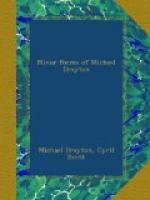Heere is none to see or tell,
All our flocks are feeding
by,
This Banke with Roses spred,
Oh it is a dainty bed,
Fit
for my Loue and me.
20
Harke the birds in yonder
Groaue,
How they chaunt vnto my Loue,
Loue be kind to me,
As I haue beene to thee,
For
thou hast wonne my hart.
Calme windes blow you faire,
Rock her thou gentle ayre,
O the morne is noone,
The euening comes too soone,
To
part my Loue and me.
30
The Roses and thy lips doo
meete,
Oh that life were halfe so
sweete,
Who would respect his breath,
That might die such a death,
Oh
that life thus might die.
All the bushes that be neere,
With sweet Nightingales beset,
Hush sweete and be still,
Let them sing their fill,
There’s
none our ioyes to let.
40
Sunne why doo’st thou
goe so fast?
Oh why doo’st thou make
such hast?
It is too early yet,
So soone from ioyes to flit
Why
art thou so vnkind?
See my little Lambkins runne,
Looke on them till I haue
done,
Hast not on the night,
To rob me of her light,
That
liue but by her eyes.
50
Alas, sweete Loue, we must
depart,
Harke, my dogge begins to
barke,
Some bodie’s comming
neere,
They shall not find vs heere,
For
feare of being chid.
Take my Garland and my Gloue,
Weare it for my sake my Loue,
To morrow on the greene,
Thou shalt be our Sheepheards Queene,
Crowned with Roses gay. 60
Mich. Drayton.
FINIS.
From T. Morley’s First Book of Ballets (1595).
Mr. M.D. to the Author.
Such was old Orpheus cunning,
That sencelesse things drew neere him,
And heards of beasts to heare him,
The stock, the stone, the Oxe, the Asse came running,
Morley! but this enchaunting
To thee, to be the Musick-God is wanting.
And yet thou needst not feare him;
Draw thou the Shepherds still and Bonny lasses,
And enuie him not stocks, stones, Oxen, Asses.
Prefixed to Christopher Middleton’s Legend
of Humphrey Duke of
Gloucester (1600).
To his friend, Master Chr. M. his Booke.
Like as a man, on some aduenture
bound
His honest friendes, their
kindnes to expresse,
T’incourage him of whome
the maine is own’d;
Some venture more, and some
aduenture lesse,
That if the voyage (happily)
be good:
They his good fortune freely




